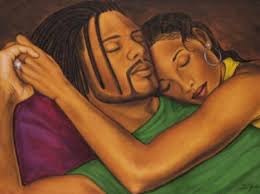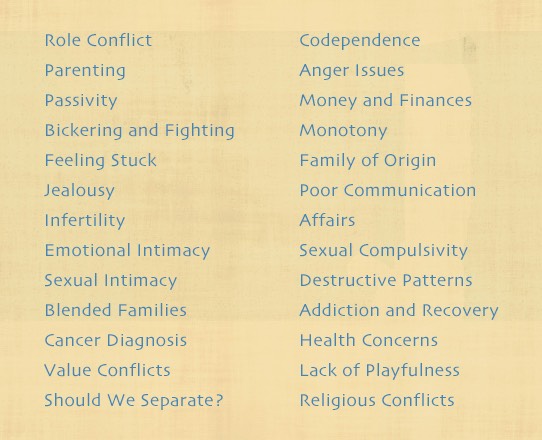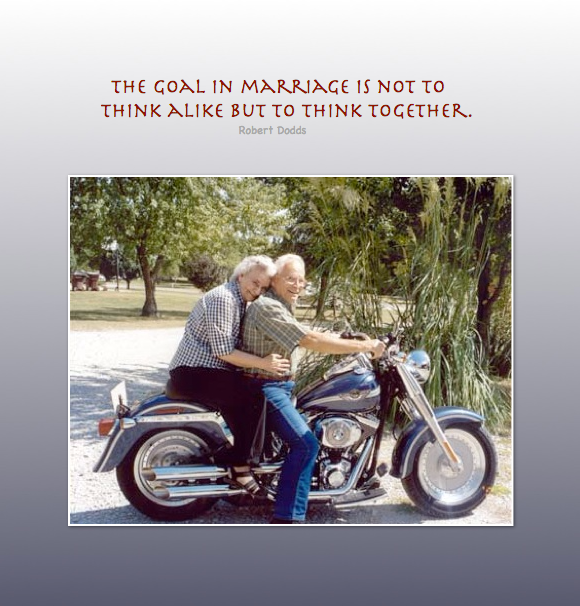Couples Work

It takes courage to love.
- anonymous
Being in relationship with others has its joys and challenges. The good news - when its working, there is nothing sweeter. Conversely, when your partnership is not going well, there is almost nothing that can feel worse to our spirit. In the hyped-up, multi-tasking world in which we live, it is little wonder that we finds ourselves sometimes adrift and sometimes oceans apart. Lifestyle choies are often at odds with the partnership we dream of having. How can we grow a conected and loving relationship if we are focused on so much else? Relationships need to be front and center if they are to blossom and continue to grow and thrive.

Intimate relationships are like a garden. When a relationship is nourished and lovingly attended to, it feels alive and feeds our spirit. Healthy partnership does not magically occur on its own, but evolves from the rich soil of communication and the willingness to feel and express our vulnerability with one another. In couples counseling, this means that guidelines are established so that you can begin to talk with one another in ways that reduce snags. Skill sets are developed to help partners find new ways of expression, where everyone feels respected, heard, and listened to. Early on, we will talk about what is working and what is not, using this data to creat a vision of your best relationship, one that you both desire, so that we can begin to work towards this end.

Couples come to therapy for many reasons. Sometimes there is a very specific incident that has prompted the need for professional guidance. Or, perhaps a couple has been feeling distant and desires some help finding their way back to one another. And sometimes, couples come to counseling as a final stop as they prepare to separate. Whatever the issues, and there are many to be had, the purpose of therapy is the same . . . to bring the two of you onto the same page. As long as both partners are willing to engage in the therapeutic process, teh result will be a deeper connection, even if you should decide to part.
Out beyond ideas of wrong-doing and right-doing,
there is a field.
I'll meet you there.
- Rumi

One of the most important pieces of the relationship puzzle finds its roots in each partner’s childhood history. We come to our partners with suitcases filled with outdated ideas about love, intimacy, conflict, and expectation. When we engage with our partner, particularly during times of stress, we are apt to do so from a purely reactionary place, rather than a responsive one. We may have learned protective mechanisms early on that served us well, yet no longer operate in our own best interest today. It is these very defenses that keep us from living relationally. We stay stuck in the same patterns of interacting, unable to find a way out.
Couples counseling provides an opportunity for you to educate yourselves about the developmental passages of marriage and couplehood. Build on your strengths together and come to understand how your individual history contributes to the difficulties you may encounter. Move beyond blame so that you can see the patterns that get in the way of the meaningful connections you would like to have. Come back to the time when you enjoyed the shelter of one another, when times felt easier and more joyful. This is my invitation to you.

I work with heterosexual, gay and lesbian couples and anyone interested in strengthening their bonds in the spirit of deep respect and care.


The Ham Story
Once upon a time, there was a happily married couple. They sometimes argued, but were always quick to make-up . . . except when it came time to make the yearly Easter ham. This became the one time of year that she felt her blood boil, and he felt criticized and misunderstood. The story goes something like this:
He likes to make the traditional ham every year for the Easter holiday.
HE: Honey, I’m ready to make the ham. Where can I find it?
SHE: (She says) It’s in the fridge. (She thinks) Here we go again. Where does he think it would be? Geez He never stops to look for anything.
HE: Thanks. Now I need the sharp knife. Where would that be?
SHE: (do I even need to tell you what she is thinking?!) She tells him where to find the knife.
And so it goes. He prepares the ham in the usual way, making sure to cut off about a 1/4 of the ham at each end. She, of course, silently fumes as she sees him waste so much of the ham, as he does each year.
Well, on this particular Easter holiday, her Aunt Bessie was in the kitchen chatting with the cook while he was busy preparing the ham. Imagine Aunt Bessie's surprise when she saw him cut off almost half of the the ham and discard it in the trash. (She thought: )Why would he do such a thing,?
Now, Aunt Bessie was known to be a talker, and as soon as she had a thought in her head, it fell right out of her mouth!
Aunt Bessie: Why in the name of Pete would you throw away a good piece of ham?
HE: That’s what you’re supposed to do.
Aunt Bessie: My heavens, who taught you to do that?
HE: Well, no one actually taught me. When I was a kid, I would see my mom cut the ends off the ham and throw them away.
Aunt Bessie: I never heard of such a thing!
Later that day, his Aunt Sue arrived for Easter dinner. His mom and dad had died many years ago, and Aunt Sue was his closest living relative.
Aunt Sue: This ham is Dee-licious! Just like your mother used to make. Can I have some more?
HE: I’m sorry, Aunt Sue, there is nothing left to eat.
SHE: That’s right, Aunt Sue (said with a classic roll of the eyes).
Aunt Bessie: Well, truth be told, your nephew threw away half of the ham right before he cooked it! I just can’t believe he would waste so much good meat.
Aunt Sue to her nephew: Why would you do such a thing?
HE: Because that’s what my mom used to do when she made the Easter ham. Don’t you remember?
Aunt Sue: Yes, I do. But what I remember even more was that her one pan wasn’t large enough to hold the meat. The ends were cut to make the ham fit inside the pan.
SHE: (didn’t have to say a word!).
And that’s the HAM STORY !
The purpose of the HAM STORY is to remind us that we often operate much like he did, going about our business on automatic pilot, based on our experiences growing up. Our younger, more naive selves, sought to make sense of our surroundings the very best way we could. We took in all kinds of information and rules for living that were not stated overtly, yet acted out in our homes each and every day. This is not necessarily a bad thing, but it is our duty to serve our adult self today, which means taking the time to understand all that we took away with us as children and evaluate what works for us today and what may get in our way. For couples, this is a crucial and liberating aspect of growing together. Once partners explore their own history, they are free to make better choices for themselves and for the well-being of the relationship.

Workshops for Couples
Relationship Tune-Up For Couples: Finding Your Way Back Home
Just as a garden needs loving care and attention to grow, committed relationships require the very same thing. Join us for this workshop designed to bring some joy and laughter into the business and busyness of your every day lives. This workshop will provide some easy tools to help you along your way. Be inspired and reconnect with the person who once stole your heart! Please Note: Both partners in the relationship must attend.
Growing Up Again
We must “grow up again” if we are to do the very best by our partners. The ways in which we respond to our partners have their very roots in the soil from which we were parented. Without mindfulness about our own childhood challenges (and we all had them), we live in reactivity rather than response. How did we learn about ourselves? What was in the mirror that reflected back to us? What beliefs do we carry that may be archaic, no longer serving us or our families? Learn how to nurture the best in yourself, so that you can truly nurture the best in your relationship. Nothing seems to shift difficulties more that when partners are committed to doing their own, inner homework, side-by-side.
Copyright © 2025 Magicseedsliving.com
All Rights Reserved